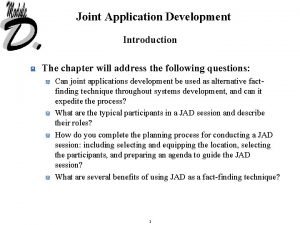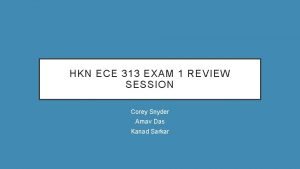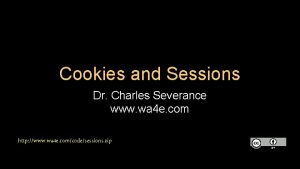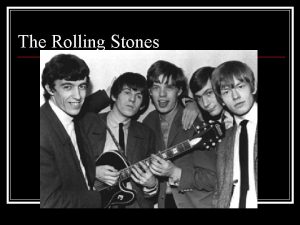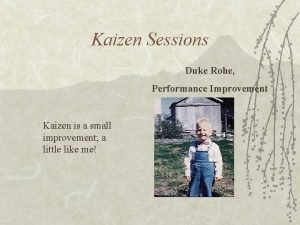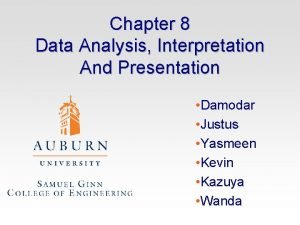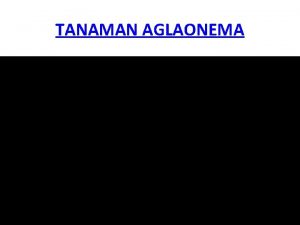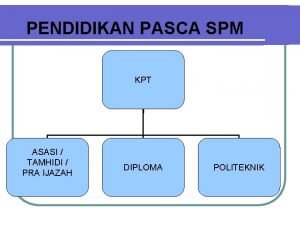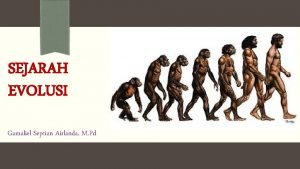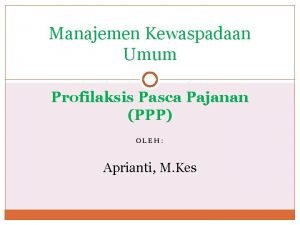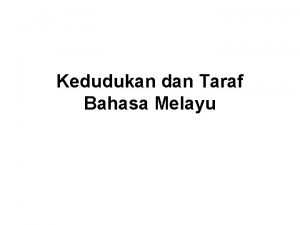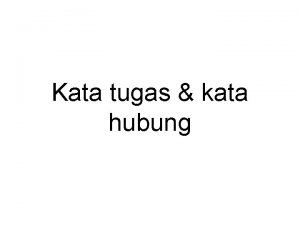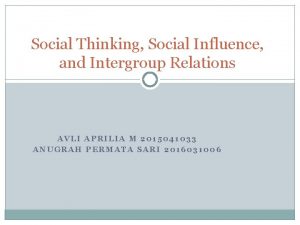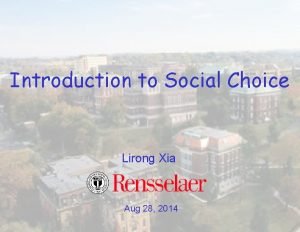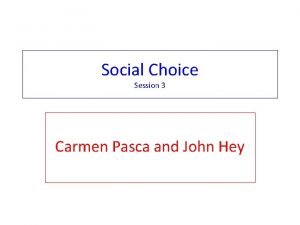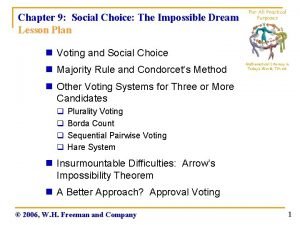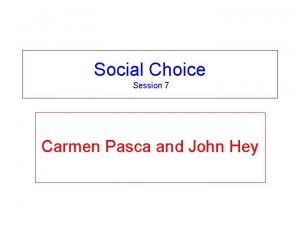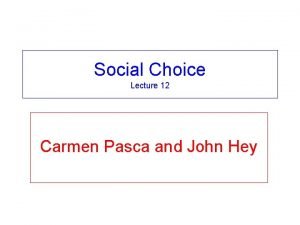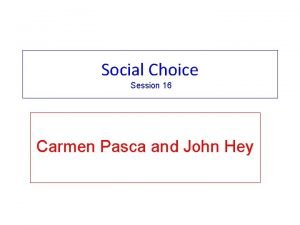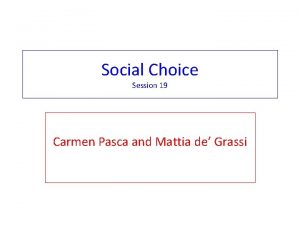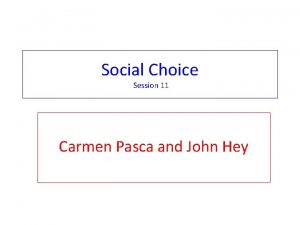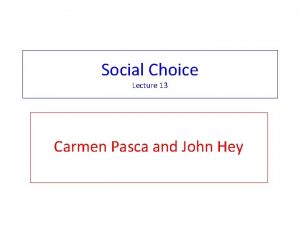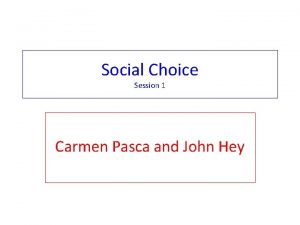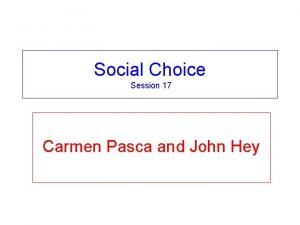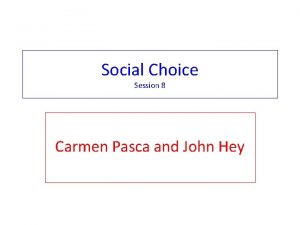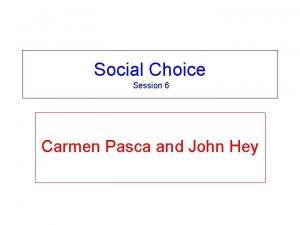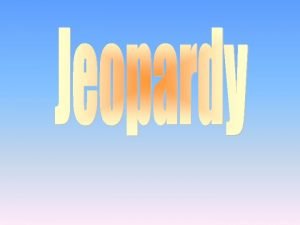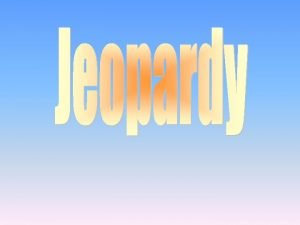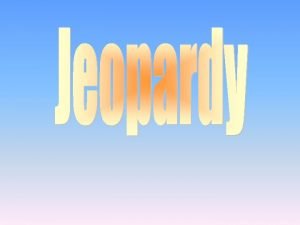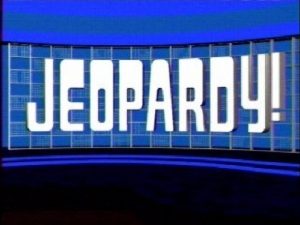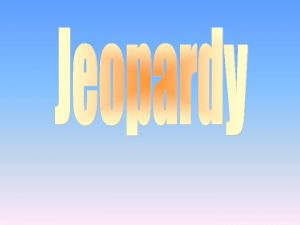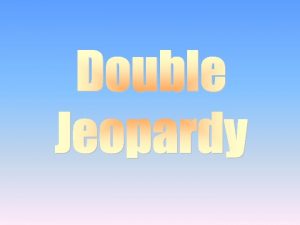Social Choice Sessions 14 and 15 Carmen Pasca









































- Slides: 41

Social Choice Sessions 14 and 15 Carmen Pasca and John Hey

Sessions 14 and 15: Plan for Today • The debate inside 3 Republics: Ancient, Modern and Contemporary following the historical and philosophical traditions. • The role of the State, the necessity of Laws , “the good government” … linked with idea of justice. • Students will be divided into 3 groups representing the republics and playing the role of philosophers. • The first is Ancient and is that of Plato and will interpret the role of philosophers: Plato, Aristotle and Socrates; • The second is Modern that of Rousseau and Hobbes and will interpret the role of philosophers; • The last is Contemporary that of Rawls and will interpret the role of philosophers.

Group 1: Ancient Republic • This group will have the appropriate citations of the philosophers. • Plato (in The Republic): “Too much freedom can turn in excess of servitude to an individual as well as a state. " • Socrates: “ the just man is the happy man”.

Group 2: Modern Republic • This group will have the appropriate citations of the philosophers Hobbes and Rousseau. • Citations: Hobbes, The Leviathan • “Homo homini lupus” • “So long as men live without a common power that keeps them in awe, they are in that condition which is called war, the war of everyone against everyone”. • Citations: Rousseau, The social contract • “Man was born free, and he is everywhere in chains”. • “To renounce liberty is to renounce being a man, the rights of humanity, even its duties. “ (Renoncer à sa liberté c'est renoncer à sa qualité d'homme, aux droits de l'humanité, même à ses devoirs). »

Group 3: The contemporary republic • This group will have the appropriate citations of the philosophers: Nozick and Rawls • Citations: Nozick, Anarchia, stato ed utopia • A minimal state, limited to the close protection functions against violence, theft, swindling, and to ensure respect for private contracts, is justified. Any extension of these functions violates the right of individuals not to be coerced, and is therefore unjustified.

Group 3: The contemporary republic • Citations: Rawls, Theory of Justice • “Each person possesses an inviolability founded on justice that even the name well-being of society as a whole, can not be transgressed. ” • “For this reason, justice prohibits the loss of freedom can be justified by some obtained by others, to a greater good. ” • “It does not accept the sacrifices imposed on a small number could be offset by increased benefits enjoyed by many”.

Social Contract Theory, philosophical approach • Social Contract Theory: philosophical tradition • Theory has its roots in the Greek philosophical tradition. Plato and Socrates stressed the importance of the relationship between the citizens and the laws of the country • Social contract theory, nearly as old as philosophy itself, is the view that persons’ moral and/or political obligations are dependent upon a contract or agreement among them to form the society in which they live. • Socrates uses something quite like a social contract argument to explain to Crito why he must remain in prison and accept the death penalty.

Socrate’s argument • Socrates’ Argument • In the early Platonic dialogue, Crito, Socrates makes a compelling argument as to why he must stay in prison and accept the death penalty, rather than escape and go into exile in another Greek city. • He personifies the Laws of Athens, and, speaking in their voice, explains that he has acquired an overwhelming obligation to obey the Laws because they have made his entire way of life, and even the fact of his very existence, possible.

Socrate’s argument • They made it possible for his mother and father to marry, and therefore to have legitimate children, including himself. • Having been born, the city of Athens, through its laws, then required that his father care for and educate him. Socrates’ life and the way in which that life has flourished in Athens are each dependent upon the Laws. • Importantly, however, this relationship between citizens and the Laws of the city are not coerced. • Citizens, once they have grown up, and have seen how the city conducts itself, can choose whether to leave, taking their property with them, or stay. Staying implies an agreement to abide by the Laws and accept the punishments that they mete out.

Socrate’s argument • Citizens, once they have grown up, and have seen how the city conducts itself, can choose whether to leave, taking their property with them, or stay. • Staying implies an agreement to abide by the Laws and accept the punishments that they mete out. • And, having made an agreement that is itself just, Socrates asserts that he must keep to this agreement that he has made and obey the Laws, in this case, by staying and accepting the death penalty. Importantly, the contract described by Socrates is an implicit one: it is implied by his choice to stay in Athens, even though he is free to leave.

Socrate’s argument • Justice then, he says, is the conventional result of the laws and covenants that men make in order to avoid these extremes. • So, from Socrate’s point of view, a just man is one who will, among other things, recognize his obligation to the state by obeying its laws.

The nature of justice • In Plato’s most well-known dialogue, Republic, social contract theory is represented again, although this time less favorably. • In Book II, Glaucon offers a candidate for an answer to the question “what is justice? ” by representing a social contract explanation for the nature of justice. • What men would most want is to be able to commit injustices against others without the fear of reprisal, and what they most want to avoid is being treated unjustly by others without being able to do injustice in return.

The State and justice • The state is the morally and politically most fundamental entity, and as such deserves our highest allegiance and deepest respect. Just men know this and act accordingly. Justice, however, is more than simply obeying laws in exchange for others obeying them as well. Justice is the state of a well-regulated soul, and so the just man will also necessarily be the happy man. So, justice is more than the simple reciprocal obedience to law, as Glaucon suggests, but it does nonetheless include obedience to the state and the laws that sustain it. • So in the end, although Plato is perhaps the first philosopher to offer a representation of the argument at the heart of social contract theory, Socrates ultimately rejects the idea that social contract is the original source of justice.

Modern social contract theory • However, social contract theory is rightly associated with modern moral and political theory and is given its first full exposition and defense by Thomas Hobbes • After Hobbes, John Locke and Jean-Jacques Rousseau are the best known proponents of this enormously influential theory, which has been one of the most dominant theories within moral and political theory throughout the history of the modern West. • Citations: • Hobbes: “Homo homini lupus” • Hobbes: “So long as men live without a common power that keeps them in awe, they are in that condition which is called war, the war of everyone against everyone”.

Hobbes approach • Thomas Hobbes • 1588 -1679, lived during the most crucial period of early modern England’s history: the English Civil War, waged from 1642 -1648. To describe this conflict in the most general of terms, it was a clash between the King and his supporters, the Monarchists, who preferred the traditional authority of a monarch, and the Parliamentarians, most notably led by Oliver Cromwell, who demanded more power for the quasi democratic institution of Parliament.

Hobbes approach • Hobbes argues, radically for his times, that political authority and obligation are based on the individual self-interests of members of society who are understood to be equal to one another, with no single individual invested with any essential authority to rule over the rest, while at the same time maintaining the conservative position that the monarch, which he called the Sovereign, must be ceded absolute authority if society is to survive.

Rousseau • J. J. Rousseau 1712 -1778, lived and wrote during what was arguably the headiest period in the intellectual history of modern France–the Enlightenment. • He was one of the bright lights of that intellectual movement, contributing articles to the Encyclopdie of Diderot, and participating in the salons in Paris, where the great intellectual questions of his day were pursued.

Jean Jacques Rousseau • Rousseau has two distinct social contract theories. The first is found in his essay, Discourse on the Origin and Foundations of Inequality Among Men, commonly referred to as the Second Discourse, and is an account of the moral and political evolution of human beings over time, from a State of Nature to modern society.

Rousseau: the state of nature • As such it contains his naturalized account of the social contract, which he sees as very problematic. The second is his normative, or idealized theory of the social contract, and is meant to provide the means by which to alleviate the problems that modern society has created for us, as laid out in the Second Discourse. • According to Rousseau, the State of Nature was a peaceful and quixotic time. People lived solitary, uncomplicated lives. Their few needs were easily satisfied by nature. Because of the abundance of nature and the small size of the population, competition was nonexistent, and persons rarely even saw one another, much less had reason for conflict or fear. Moreover, these simple, morally pure persons were naturally endowed with the capacity for pity, and therefore were not inclined to bring harm to one another.

Rousseau: the division of labor • Divisions of labor were introduced, both within and between families, and discoveries and inventions made life easier, giving rise to leisure time. • Such leisure time inevitably led people to make comparisons between themselves and others, resulting in public values, leading to shame and envy, pride and contempt. • Most importantly however, according to Rousseau, was the invention of private property, which constituted the pivotal moment in humanity’s evolution out of a simple, pure state into one characterized by greed, competition, vanity, inequality, and vice. For Rousseau the invention of property constitutes humanity’s ‘fall from grace’ out of the State of Nature.

Rousseau, the private proprerty • Having introduced private property, initial conditions of inequality became more pronounced. Some have property and others are forced to work for them, and the development of social classes begins. Eventually, those who have property notice that it would be in their interests to create a government that would protect private property from those who do not have it but can see that they might be able to acquire it by force. • So, government gets established, through a contract, which purports to guarantee equality and protection for all, even though its true purpose is to fossilize the very inequalities that private property has produced.

Rousseau, how you live togheter? • The Social Contract begins with the most oft-quoted line from Rousseau: “Man was born free, and he is everywhere in chains”. • Humans are essentially free, and were free in the State of Nature, but the ‘progress’ of civilization has substituted subservience to others for that freedom, through dependence, economic and social inequalities, and the extent to which we judge ourselves through comparisons with others. Since a return to the State of Nature is neither feasible nor desirable, the purpose of politics is to restore freedom to us, thereby reconciling who we truly and essentially are with how we live together. So, this is the fundamental philosophical problem that The Social Contract seeks to address: how can we be free and live together?

Rousseau today • One implication of this is that the strong form of democracy which is consistent with the general will is also only possible in relatively small states. The people must be able to identify with one another, and at least know who each other are. They cannot live in a large area, too spread out to come together regularly, and they cannot live in such different geographic circumstances as to be unable to be united under common laws. (Could the present-day U. S. satisfy Rousseau’s conception of democracy? It could not. ) • Although the conditions for true democracy are stringent, they are also the only means by which we can, according to Rousseau, save ourselves, and regain the freedom to which we are naturally entitled.

Session 14: • In the twentieth century, moral and political theory regained philosophical momentum as a result of John Rawls’ Kantian version of social contract theory, and was followed by new analyses of the subject by David Gauthier and others. • More recently, philosophers from different perspectives have offered new criticisms of social contract theory

Locke’s approach • While Locke uses Hobbes’ methodological device of the State of Nature, as do virtually all social contract theorists, he uses it to a quite different end. • Locke’s arguments for the social contract, and for the right of citizens to revolt against their king were enormously influential on the democratic revolutions that followed, especially on Thomas Jefferson, and the founders of the United States.

Locke • Locke’s most important and influential political writings are contained in his Two Treatises on Government. • The first treatise: political authority was derived from religious authority, also known by the description of the Divine Right of Kings, which was a very dominant theory in seventeenth-century England. • The second treatise contains Locke’s own constructive view of the aims and justification for civil government, and is titled “An Essay Concerning the True Original Extent and End of Civil Government”.

Locke’s approach • According to Locke, the State of Nature, the natural condition of mankind, is a state of perfect and complete liberty to conduct one’s life as one best sees fit, free from the interference of others. • This does not mean, however, that it is a state of license: one is not free to do anything at all one pleases, or even anything that one judges to be in one’s interest. • The State of Nature, although a state wherein there is no civil authority or government to punish people for transgressions against laws, is not a state without morality. The State of Nature is pre-political, but it is not pre-moral.

State of Nature according to Locke • The State of Nature is a state of liberty where persons are free to pursue their own interests and plans, free from interference, and, because of the Law of Nature and the restrictions that it imposes upon persons, it is relatively peaceful. • Since in the State of Nature there is no civil power to whom men can appeal, and since the Law of Nature allows them to defend their own lives, they may then kill those who would bring force against them. Since the State of Nature lacks civil authority, once war begins it is likely to continue. And this is one of the strongest reasons that men have to abandon the State of Nature by contracting together to form civil government.

Locke, the civil government • Property plays an essential role in Locke’s argument for civil government and the contract that establishes it. • According to Locke, private property is created when a person mixes his labor with the raw materials of nature • Property is the linchpin of Locke’s argument for the social contract and civil government because it is the protection of their property, including their property in their own bodies, that men seek when they decide to abandon the State of Nature. • Political society comes into being when individual men, representing their families, come together in the State of Nature and agree to each give up the executive power to punish those who transgress the Law of Nature, and hand over that power to the public power of a government

Locke, the political society • In other words, by making a compact to leave the State of Nature and form society, they make “one body politic under one government” (par. 97) and submit themselves to the will of that body. • One joins such a body, either from its beginnings, or after it has already been established by others, only by explicit consent. Having created a political society and government through their consent, men then gain three things which they lacked in the State of Nature: laws, judges to adjudicate laws, and the executive power necessary to enforce these laws. Each man therefore gives over the power to protect himself and punish transgressors of the Law of Nature to the government that he has created through the compact.

Locke, the better civil government • The executive power of a government: the justification of the authority of the executive component of government is the protection of the people’s property and well-being, so when such protection is no longer present, or when the king becomes a tyrant and acts against the interests of the people, they have a right, if not an outright obligation, to resist his authority. • The social compact can be dissolved and the process to create political society begun anew. • Because Locke did not envision the State of Nature as grimly as did Hobbes, he can imagine conditions under which one would be better off rejecting a particular civil government and returning to the State of Nature, with the aim of constructing a better civil government in its place. It is therefore both the view of human nature, and the nature of morality itself, which account for the differences between Hobbes’ and Locke’s views of the social contract.

More Recent Social Contract Theories • In the twentieth century, moral and political theory regained philosophical momentum as a result of John Rawls’ Kantian version of social contract theory, and was followed by new analyses of the subject by David Gauthier and others. • More recently, philosophers from different perspectives have offered new criticisms of social contract theory • John Rawls’ A Theory of Justice • In A Theory of Justice, Rawls argues that the moral and political point of view is discovered via impartiality. (It is important to note that this view, delineated in A Theory of Justice, has undergone substantial revisions by Rawls, and that he described his later view as “political liberalism”. ) • He invokes this point of view (the general view that Thomas Nagel describes as “the view from nowhere”) by imagining persons in a hypothetical situation, the Original Position, which is characterized by the epistemological limitation of the Veil of Ignorance.

Rawls, the veil of ignorance • Rawls’ original position is highly abstracted version of the State of Nature. It is the position from which we can discover the nature of justice and what it requires of us as individual persons and of the social institutions through which we will live together cooperatively. • In the original position, behind the veil of ignorance, one is denied any particular knowledge of one’s circumstances, such as one’s gender, race, particular talents or disabilities, one’s age, social status, one’s particular conception of what makes for a good life, or the particular state of the society in which one lives. Persons are also assumed to be rational and disinterested in one another’s well-being.

Rawls, the principles of a just society • These are the conditions under which, Rawls argues, one can choose principles for a just society which are themselves chosen from initial conditions that are inherently fair. • Because no one has any of the particular knowledge he or she could use to develop principles that favor his or her own particular circumstances, in other words the knowledge that makes for and sustains prejudices, the principles chosen from such a perspective are necessarily fair. • For example, if one does not know whether one is female or male in the society for which one must choose basic principles of justice, it makes no sense, from the point of view of self-interested rationality, to endorse a principle that favors one sex at the expense of another, since, once the veil of ignorance is lifted, one might find oneself on the losing end of such a principle

Rawls • Because the conditions under which the principles of justice are discovered are basically fair, justice proceeds out of fairness. • In such a position, behind such a veil, everyone is in the same situation, and everyone is presumed to be equally rational. Since everyone adopts the same method for choosing the basic principles for society, everyone will occupy the same standpoint: that of the disembodied, rational, universal human. • Therefore all who consider justice from the point of view of the original position would agree upon the same principles of justice generated out of such a thought experiment.

Rawls, the two principles of justice • Any one person would reach the same conclusion as any other person concerning the most basic principles that must regulate a just society. • The principles that persons in the Original Position, behind the Veil of Ignorance, would choose to regulate a society at the most basic level (that is, prior even to a Constitution) are called by Rawls, aptly enough, the Two Principles of Justice. • These two principles determine the distribution of both civil liberties and social and economic goods.

The first and second principles of justice • The first principle states that each person in a society is to have as much basic liberty as possible, as long as everyone is granted the same liberties. That is, there is to be as much civil liberty as possible as long as these goods are distributed equally. (This would, for example, preclude a scenario under which there was a greater aggregate of civil liberties than under an alternative scenario, but under which such liberties were not distributed equally amongst citizens. ) • The second principle states that while social and economic inequalities can be just, they must be available to everyone equally (that is, no one is to be on principle denied access to greater economic advantage) and such inequalities must be to the advantage of everyone.

Rawls, the inequalities • This means that economic inequalities are only justified when the least advantaged member of society is nonetheless better off than she would be under alternative arrangements. • So, only if a rising tide truly does carry all boats upward, can economic inequalities be allowed for in a just society. • The method of the original position supports this second principle, referred to as the Difference Principle, because when we are behind the veil of ignorance, and therefore do not know what our situation in society will be once the veil of ignorance is lifted, we will only accept principles that will be to our advantage even if we end up in the least advantaged position in society.

Rawls, the distinction between economic and social goods • These two principles are related to each other by a specific order. The first principle, distributing civil liberties as widely as possible consistent with equality, is prior to the second principle, which distributes social and economic goods. In other words, we cannot decide to forgo some of our civil liberties in favor of greater economic advantage. Rather, we must satisfy the demands of the first principle, before we move on to the second. • From Rawls’ point of view, this serial ordering of the principles expresses a basic rational preference for certain kinds of goods, i. e. , those embodied in civil liberties, over other kinds of goods, i. e. , economic advantage.

Rawls, the abstract approach of social contract • Having argued that any rational person inhabiting the original position and placing him or herself behind the veil of ignorance can discover the two principles of justice, Rawls has constructed what is perhaps the most abstract version of a social contract theory. • It is highly abstract because rather than demonstrating that we would or even have signed to a contract to establish society, it instead shows us what we must be willing to accept as rational persons in order to be constrained by justice and therefore capable of living in a well ordered society.

Rawls, the constitution • The principles of justice are more fundamental than the social contract as it has traditionally been conceived. Rather, the principles of justice constrain that contract, and set out the limits of how we can construct society in the first place. • If we consider, for example, a constitution as the concrete expression of the social contract, Rawls’ two principles of justice delineate what such a constitution can and cannot require of us. • Rawls’ theory of justice constitutes, then, the Kantian limits upon the forms of political and social organization that are permissible within a just society.
 Good choice or bad choice
Good choice or bad choice How to conduct jad sessions
How to conduct jad sessions Hkn uiuc review sessions
Hkn uiuc review sessions Employee listening sessions
Employee listening sessions Academic success center tamu
Academic success center tamu Asn scientific sessions
Asn scientific sessions Dr charles severance
Dr charles severance Cisco webex breakout rooms
Cisco webex breakout rooms Rolling stone origin
Rolling stone origin Stats
Stats Kaizen sessions
Kaizen sessions Damodar sessions
Damodar sessions Panen dan pasca panen aglaonema
Panen dan pasca panen aglaonema Pasca spm
Pasca spm Pengertian pasca produksi
Pengertian pasca produksi Teori evolusi pasca darwin
Teori evolusi pasca darwin Penyelesaian audit dan tanggung jawab pasca audit
Penyelesaian audit dan tanggung jawab pasca audit Egg plant harvest
Egg plant harvest Penanganan pasca panen serealia
Penanganan pasca panen serealia Profilaksis pasca pajanan hiv
Profilaksis pasca pajanan hiv Pasca merdeka atau pascamerdeka
Pasca merdeka atau pascamerdeka Alamat bahagian pasca perkhidmatan jpa
Alamat bahagian pasca perkhidmatan jpa Fisiologi pasca panen adalah
Fisiologi pasca panen adalah Pasca panen lada
Pasca panen lada Paska kontruksi
Paska kontruksi Bina ayat kata hubung tetapi
Bina ayat kata hubung tetapi Uji pasca senggama
Uji pasca senggama Pengertian printer stelsel
Pengertian printer stelsel Pengertian pasca panen
Pengertian pasca panen Pengertian pasca panen
Pengertian pasca panen Persiapan pementasan drama
Persiapan pementasan drama Simak pasca ipb
Simak pasca ipb Ciri-ciri coaching and mentoring
Ciri-ciri coaching and mentoring Magister manajemen gunadarma
Magister manajemen gunadarma Besaran biaya hidup tubel kemenkes
Besaran biaya hidup tubel kemenkes Seminar pasca ipb
Seminar pasca ipb Social thinking adalah
Social thinking adalah Social thinking social influence social relations
Social thinking social influence social relations Social choice voucher
Social choice voucher Social choice voucher
Social choice voucher Arrow's theorem
Arrow's theorem Social choice voucher
Social choice voucher

